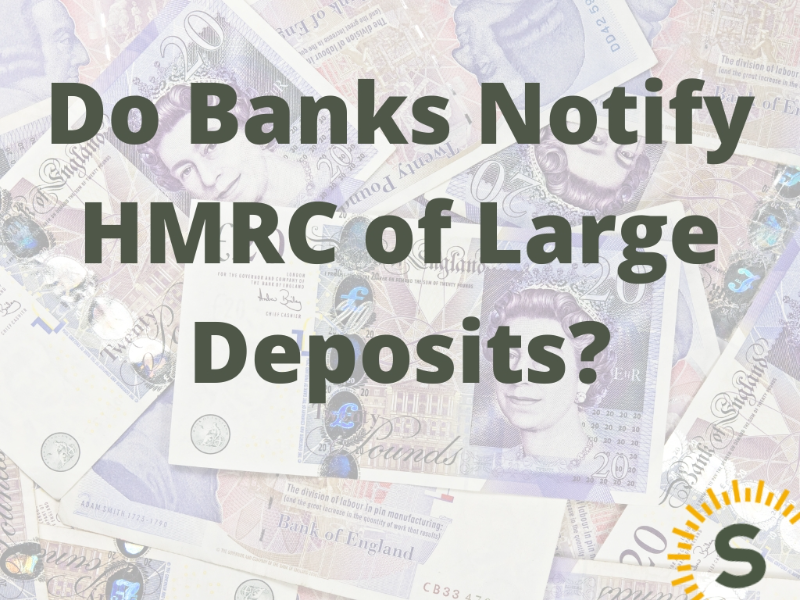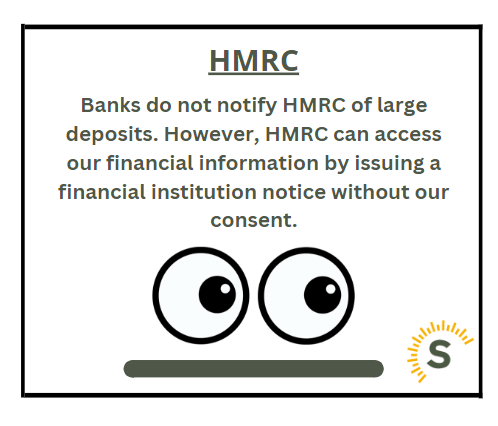
As individuals, we often wonder about the extent of financial data that HMRC (Her Majesty's Revenue and Customs) can access.
One question that frequently arises is whether banks are obligated to notify HMRC of large deposits.
In this article, we will explore this topic in detail and shed light on the extent of HMRC's access to our financial information.
Banks do not notify HMRC of large deposits. However, HMRC can access our financial information by issuing a financial institution notice without our consent. They can see large deposits and other financial data like interest earned, crypto, dividends, pension contributions, Gift Aid payments, and more.
Try it FREE for 30 days, then £14.99 a month - cancel online anytime
HMRC can investigate taxpayers and ask for information from different sources like banks and financial institutions. Before, they used "third party notices" to get data from banks, lawyers, accountants, and estate agents, but they needed taxpayer approval or tribunal approval.
They had to show that the information was "reasonably required" for their investigation.

In June 2021, HMRC introduced a new mechanism called the "Financial Institution Notice" (FINS). This notice enables HMRC to compel financial institutions to provide information about a taxpayer without the need for consent from the individual or approval from an independent tribunal.
The primary motivation behind this change was the time-consuming process of obtaining information from overseas banks.
To put it simply, HMRC's power to access our financial information has widened with the introduction of FINS. This change has raised concerns amongst taxpayers, prompting them to question the extent of data that HMRC can access.
Generally, you don't need to notify your bank of a large deposit. However, HMRC may access your financial information through Financial Institution Notices, so it's essential to be aware of their access to various aspects of your finances.
HMRC can check bank accounts as far back as they need to, without any specific time limits. They use their information gathering powers from Schedule 36, Finance Act 2008 to support their investigations.
Apart from large deposits, HMRC has access to various other types of third-party data. Let's take a closer look at the information HMRC can acquire:
HMRC can access information related to the interest earned from banks and building societies. This expands on the existing data available to them.
HMRC can obtain details of dividends received from UK companies and distributions from authorised unit trusts.
They can also access information on distributions from both UK and overseas open-ended investment companies.
Not only can HMRC access your deposit information through your bank, but many of the main cryptocurrency exchanges, like Binance and Coinbase, have also agreed and included in their terms that they will pass information to HMRC.
Information regarding pension contributions made by individuals is also accessible to HMRC. This includes contributions to personal and workplace pensions.
HMRC has the ability to access data on Gift Aid payments made to charities. This helps them ensure compliance with tax regulations related to charitable donations.
HMRC can obtain information from investment and wealth managers. This includes details about chargeable gains, excess reportable income, interest, dividends, and equalization payments.
Details of chargeable events related to insurance bonds are also within HMRC's reach. This allows them to monitor taxable events associated with insurance policies.
HMRC can access data on royalties earned by individuals. This includes income from intellectual property, such as books, music, or patents.
As you can see, HMRC's ability to access our financial information extends beyond just checking personal bank accounts. They have the power to delve into various aspects of our financial lives.
You won't be reported for depositing money into your bank account unless it appears suspicious or resembles money laundering. Depositing £5k or more in cash will prompt your bank to ask about the money's source to prevent fraud and laundering.
With HMRC's increased access to financial information, it's vital to manage your accounts well.
For self-employed individuals, maintaining separate business and personal bank accounts is crucial. This separation prevents confusion and complications, ensuring your finances are organised and compliant.
HMRC can check your bank account. However, this can only be done if you are being investigated for tax fraud. However, they must have permission from you to do so. If you do not cooperate it can effect the outcome of the investigation.
In summary, HMRC now has more power to access our financial information through Financial Institution Notices (FINS). Although banks don't automatically notify HMRC of large deposits, it's crucial to understand that HMRC can still access more than just personal bank accounts. They can get information from various sources.
HMRC can access various financial data through FINS, including large deposits, interest earned, dividends, cryptocurrency deposits, pension contributions, Gift Aid payments, and more.
Maintaining separate accounts ensures clarity, compliance, and accurate tax preparation. It helps self-employed individuals identify deductible business expenses, prevent errors, demonstrate professionalism, streamline audits, and comply with record-keeping requirements.
Individuals won't be reported for depositing money unless it appears suspicious or resembles money laundering. Depositing £5,000 or more in cash may prompt the bank to enquire about the source of funds to prevent fraud and laundering.
HMRC may employ various criteria or algorithms to flag suspicious deposits, such as unusual transaction patterns, inconsistent income sources, or deposits exceeding certain thresholds relative to the individual's known financial activity.
If HMRC detects suspicious activity, individuals may face further investigation, potential fines, or legal consequences. Failure to cooperate with HMRC enquiries could exacerbate the situation and may result in adverse outcomes.
It's important to understand the extent of HMRC's authority and the legal frameworks governing access to financial information. Individuals may have rights to privacy and due process, and there could be procedures for challenging or appealing HMRC's requests for information.

Stuart is an expert in Property, Money, Banking & Finance, having worked in retail and investment banking for 10+ years before founding Sunny Avenue. Stuart has spent his career studying finance. He holds qualifications in financial studies, mortgage advice & practice, banking operations, dealing & financial markets, derivatives, securities & investments.





Our website offers information about financial products such as investing, savings, equity release, mortgages, and insurance. None of the information on Sunny Avenue constitutes personal advice. Sunny Avenue does not offer any of these services directly and we only act as a directory service to connect you to the experts. If you require further information to proceed you will need to request advice, for example from the financial advisers listed. If you decide to invest, read the important investment notes provided first, decide how to proceed on your own basis, and remember that investments can go up and down in value, so you could get back less than you put in.
Think carefully before securing debts against your home. A mortgage is a loan secured on your home, which you could lose if you do not keep up your mortgage payments. Check that any mortgage will meet your needs if you want to move or sell your home or you want your family to inherit it. If you are in any doubt, seek independent advice.